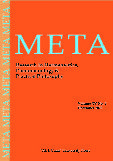Affektion und Zeitlichkeit bei Kant und Husserl
Abstract
Affection and Temporality by Kant and Husserl
In Critics of pure reason the notion of affection appears at first in the "Transcendental Aesthetic" (B 67-69, 93) and is unfolded on the notion of self-affection in the "Transcendental Analytic" (B 153-156). Husserl, in manuscripts written from 1918 (Husserliana XI), presents some developments of these Kantian notions. If by affection Kant explains that something can be given to the subject from the sensibility, that is, something that affects oneself from the external and the internal sense, however, Husserl extends the analysis of affection toward a broad spectrum of underlying phenomena, such as volitive acts, imaginative acts, drives and affects. Husserl also analyzes from a phenomenological point of view the Kantian implicit condition that, if anything is given to the subject in the internal consciousness of time, the relationship to itself must be thought as a temporal process (or as temporal structuring modes of consciousness). I intend to show that Husserl’s analysis of affection and its modulations unveil possible theoretical directions departing from Kant, but in this step, involving a change of focus on the transcendental field, more specifically on the transcendental foundation of temporality.
Keywords: Kant, Husserl, affection, temporality, passive synthesis
[Full Article PDF]




